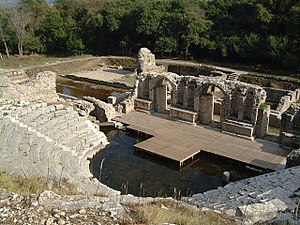 |
Στην Ολυμπία, όταν τιμωρούνταν παραβάτες αθλητικών κανονισμών, πλήρωναν χρηματικό πρόστιμο. Από τα χρήματα αυτά κατασκευάζονταν αγάλματα του Δία, οι Ζάνες, εμπρός από την είσοδο του σταδίου. (Στη φωτογραφία εικονίζεται ό,τι έχει απομείνει σήμερα από τα αγάλματα αυτά· οι βάσεις τους). |
Την αδήριτη εσωτερική ανάγκη επικράτησης του ενός ανθρώπου εις βάρος του άλλου, η οποία εκφράζεται κατά κυρίαρχο τρόπο με το ένστικτο της επιθετικότητας, επιχείρησαν να τιθασεύσουν δια του αθλητισμού, ο οποίος όμως στην πράξη ευτελίστηκε με τον επαγγελματισμό, την εξαγορά και τις αγριότητες των αναμετρήσεων. Στους Ολυμπιακούς και τους άλλους τοπικούς αγώνες, είχε διεισδύσει η διαφθορά. Κυριαρχούσε το πάθος για πλουτισμό με παρανομίες, συμβιβασμούς, δωροδοκίες και ανοχή κερδοσκοπικών συναλλαγών.
In English
In Olympia, where offenders punished sporting regulations, paid a fine. From these funds were made statues of Zeus, the Zanes, in front of the entrance of the stadium.(The photo depicts what remains today of the statues; their bases).
The dire need for internal domination of one man against another, which is expressed in a dominant way the instinct of aggression, attempted to harnessthrough the sport, but who in practice eftelistike with professionalism, redemptionand the atrocities of competitions. Olympic and other local races, had infiltratedcorruption. Dominated by passion and illicit enrichment, compromise, tolerance ofbribes and speculative transactions.
-------------------------------------------------------------------------------------------------
Bazuar ne doreshkrimin e A F Kocaqit" mbi mbetjet origjinale te gjuhes se pellazgeve".
"Hesychi Alexandrinos Lexicon", Mauricio Schmidt,fjala "Zoteatas"
1 - Zoteatas = Zot
2 -Ata,Ati fjalë shqipe-arvanite,arbërore
3 - A-pollon/Apollonia = Polloni A,A-lek -Leka,A-leka-Leka,A-pirro-Pirro,A-min -Minoa,A-gur-Gur,Guri,Gurija,A-Malo/ A-malia
A-Frikë/Frika ,.....
Evaluation of the alphabet in ancient human heritage
4 - Ar-gos dhe Gosa e Kavajës
5 - Ar-ka - Dia = Ar ka Dia ,këtu tre fjalë shqipe së bashku
- Scientific origin of the name "Dia, Die". The first part
- Scientific origin of the name "Dia,Die". Part Two
8 - Zanes si dhe emrat që trashegohen sot në Shqiperi si Zana,Zano,Myrteza,
9 - Olimbi ,në gjuhen Shqipe = vazo lulesh,njësoj si maja e malit Olimbo në Greqinë e sotme .Emrat Olimbi vetem te ortodokset femra të Shqiperise .Olimbi dhe jo Olimpi -Olimpik.Këtu gjuha Greke eshte ngatërruar pasi shkruhet Olimmpi,me dy gërma M,m njëra pas tjetres ,ku B,b = Mp,mp (Olim-mp-ik = Olim-b-ik)
10 - Aga-mëm-nona (in greek Agamemnon) = Aga i mëmës Nonë,dmth mëmës më të vjetër .
11 - A-ki-ill = Ky-yll-A ,sipas Shqipes standarte sot .
Vetëm fillimi ,do të pasurohet
12 - Zeus(origjinal in albanian Zëu) eshte djelli shqiptar,zot i zotave ,qëndrori,i zhurmueshmi dhe jo Dia i grekeve që eshte ne fakt Jupiteri
in english
1 - Zoteatas = God
2 - Father,They-Arvanit Albanian arberorswords .
3 - A-pollon/Apollonia =Polloni A, A-Lek/A Leka Leku/Leka, A-Pirro/ Pirro,A-min-Minot, A-calculus, calculus, stone, stone, A-Malo / A -Mount
A Fear / Fear, ....
4 - Ar-GOSS and Gosa Kavaja
8 - Zanes and inherited names today in Albania as Zana, ZANON, Myrteza,
9 - Olimbi, in Albanian = vases, like the top of Mt Olimbo in Greece today. NamesOlimbi only Albanian Orthodox women.
Olimbi and non-Olympic Olympics.
Here the Greek language is confusing as written Olimmpi, with two letters M, m, one after another, where B, b = Mp, mp (Olim-mp-ik = Olim-b-ik)
10 - Aga-MEM Nona (in greek Agamemnon) The parent = None Aga, ie the olderparent.
11 - A-ki-ill = This-Is-star, according to the standard Eagle today.
12 - Zeus (original in albanian Zëu) is Albanian sun, the god of gods, Main, thezhurmueshmi (boomer) and not the Greeks that Dia is actually Jupi-ter
Just beginning, will be enriched










